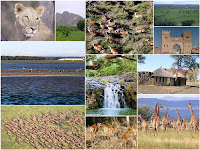The Matthews Mountain Range: Kenya's Wonder 'Island' Gets Attention
Very few people know of or have ever heard of Kenya's pristine Matthews Mountain Range, also known as the Lenkiyio Hills. It is over 2,700m above sea level; is densely covered with forest; is one of the wildest parts of Kenya and has many, never known before species of plants and animals. But now, it is getting attention; an expedition - organized by the Northern Rangelands Trust and Namunyak Conservancy , is underway. It is funded by The Nature Conservancy and taking part too, in the expedition - are scientists from the National Museums of Kenya and the TNC: View Larger Map The Matthews Range of mountains rises from the arid brown plains of northern Kenya like a green tropical island; its peaks looming above the dusty haze blanketing the otherwise featureless landscape. The flat lands that surround it stretch for almost 100km in any direction, leaving the Matthews blissfully isolated. It has been this way for at least 10 millennia, the dry sea lapping against its shores -...




